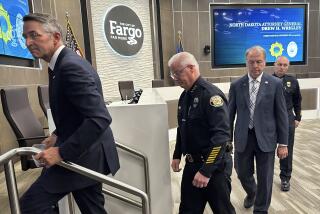Men in Haditha pointed guns, Marine says
- Share via
CAMP PENDLETON — A Marine lance corporal accused of executing three unarmed Iraqi brothers in Haditha told a hearing officer Thursday that he killed them after two of them pointed AK-47s at him while he searched their home for insurgents.
“I kept firing until my magazine was empty because I didn’t know if they had body armor or suicide vests,” Lance Cpl. Justin L. Sharratt told the hearing officer at his Article 32 inquiry, similar to a preliminary hearing. “As I fired at the other insurgents in the room, I felt as though they were coming toward me.”
The statement was unsworn, and thus Sharratt was not required to answer questions from prosecutors.
Sharratt, 22, whose family lives in suburban Pittsburgh, said he opened fire instantly after seeing the AK-47s. Sharratt said his machine gun jammed and that he then used a 9-millimeter handgun he had borrowed from a Navy corpsman.
“There’s an old saying among Marines,” he told hearing officer Lt. Col. Paul Ware. “ ‘I’d rather be judged by 12 of my peers instead of being carried in a casket by six of my friends.’ ”
Once the hearing is completed, Ware will recommend to Lt. Gen. James N. Mattis whether the case should go to court-martial, be dismissed or be handled administratively. Four officers and three enlisted Marines have been charged in the November 2005 killings of 24 civilians in Haditha.
“We did not execute any Iraqi males,” Sharratt said in a strong, clear voice. “I am a disciplined Marine.... On Nov. 19, I did exactly as I was trained to do.”
Prosecutors assert that the three Iraqi men were unarmed and that Sharratt and Staff Sgt. Frank D. Wuterich killed them at close range without provocation.
Sharratt said he gave the AK-47s to a Marine the day of the incident. But testimony indicated that there was no clear record of the weapons being recovered at the house, although records do show two AK-47s being recovered somewhere in the neighborhood that day.
Prosecutors also assert that because the Iraqis were slain with a handgun, the killings were “execution-style,” because troops rarely use handguns when assaulting houses. But a military pathologist said pictures of the dead men did not suggest that the fatal bullets were fired at close enough range to show the powder burns consistent with such a mode of killing.
Sharratt said he and other Marines went to “clear” the house after seeing male Iraqis repeatedly peeking at them over a wall. Marines said they thought the Iraqis might have been responsible for a roadside bomb that had exploded beneath a Marine convoy, killing one Marine and wounding two others.
At first, the clearing of houses went smoothly, Sharratt told Ware. Then in one house, he said, he heard in a back bedroom the distinct sound of AK-47s being prepared to fire.
“I knew if there were insurgents inside that room with weapons,
He told Ware that he would act the same today if put in the same situation.
“I will always be proud of my service in Iraq,” he said. “And I will always be proud to be a Marine.”
Sharratt was on his second combat tour in Iraq with the 3rd Battalion, 1st Marine Regiment. He received a combat action ribbon for his role in the battle in Fallouja in late 2004; the ribbon, at that time, was awarded only to Marines who came under fire and returned fire.
His parents, Theresa and Darryl Sharratt, have attended the hearing. The session Thursday involved several hours of testimony from a pathologist about the fatal wounds to the Iraqis; close-up pictures of the bodies were shown.
Theresa Sharratt said the pictures did not shake her faith in her son’s innocence.
“Here’s the way I look at it,” she told a reporter. “Those men were trying to kill my son. I’d rather get a phone call [from him saying he’s facing criminal charges] than have two Marines coming to my door telling me my son is dead.”
More to Read
Sign up for Essential California
The most important California stories and recommendations in your inbox every morning.
You may occasionally receive promotional content from the Los Angeles Times.








